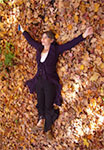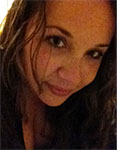Three Poems
Navigating wind in the chest
I walked the path between two solstices
with a swarm of angels
a flock of insects, miniature jaguars
and the rattle of day still reverberating.
Those seminal forces
luring me to the honeycomb
where the hummingbird and winter cicada whirred.
Navigating toward high seas
dad and mom
are two coasts
glued on the scorched edge of the map.
I wonder what language I will speak
on my deathbed.
Flock of one
…your sheep that were wont to be so meek and tame, and so small eaters, now,
as I heard say, be become so great devourers and so wild, that they eat up, and
swallow down the very men themselves.
—Thomas More, Utopia
It was so white. Freshly shorn
seemed as if they had removed
cottony clouds
and about a foot of him had fallen
defeated by its own weight.
In his view
a lake surrounded by reeds
a body of water
embedded in the gentle hand of evening.
But they came, mostly women.
No one noticed
when the fluffy tail grew a stinger
the bleating tongue split in two
and the snowy fur
began to grow scales
between misty tangles of hair.
No one noticed.
Letter to Khaled
Khaled, I carry your people on my back like a stone. Will we be condemned to this long climb, Sisyphus of red pearls encased in their box, you inside me like marrow in bone, fire in the sun, silver in the moon? And sand from all the world’s hourglasses would not be enough to cover the dead in Gaza cemeteries.
Khaled, if only I had beautiful enough words, and an angel to whip me with his quill, words as luminous as dawn, caress, petal, quetzal feathers, so the stone might roll off my back, plummeting lead that sinks to the dregs where your dead have ended up.
![]()
Navegación viento de pecho
Recorrí el camino entre dos solsticios
con un enjambre de ángeles,
una parvada de insectos, jaguares en miniatura,
y la sonaja del día que no ha dejado de tañer.
Aquellas fueron fuerzas seminales
para atraerme hacia el panal
donde zumbaría el colibrí y la cigarra de invierno.
Navegación hacia alta mar,
papá y mamá
son dos litorales
pegados en la orilla chamuscada del mapa.
Me pregunto qué idioma hablaré
en mi lecho de muerte.
Rebaño de un solo miembro
Los corderos que tan mansos y dóciles acostumbraban
ser y de tan poco apetito, dícenme ahora que se han
convertido en devoradores tan grandes y feroces que
se tragan y engullen incluso a los propios hombres.
—Tomás Moro, Utopía
Era tan blanco. Recién trasquilado,
parecía como si le hubieran quitado
nubes algodonosas,
y hubiesen caído a un palmo de él,
vencidas por su propio peso.
En la mirada tenía
un lago rodeado de juncos,
un cuerpo de agua
incrustado en la mano dulce del atardecer.
Pero llegaron, la mayoría mujeres.
Nadie se dio cuenta
cuando la cola espumosa desarrolló un aguijón,
la lengua que balaba se partió en dos,
y el pelambre nevado
empezó a cultivar escamas
entre marañas de pelos neblinosos.
Nadie se dio cuenta.
Carta a Khaled
Khaled, llevo tu pueblo a cuestas como una piedra. ¿Seremos acaso condenados a este largo ascenso, Sísifos de perlas rojas encerradas en su caja, tú en mí como la médula al hueso, el fuego al sol, la plata a la luna? Y todos los relojes de arena del mundo no alcanzarían a cubrir los muertos en los cementerios de Gaza.
Khaled, quisiera palabras tan hermosas, y el ángel me latiguea con su cálamo, palabras tan luminosas como alba, caricia, pétalo, pluma de quetzal, y la piedra rueda de mi espalda, plomo que se hunde en picada hasta la hez donde tus muertos han ido a parar.
Translator’s Note
Robert Bly’s eight stages of translation is a fair representation of my general technical approach to translating a poem. However, before I begin translating, I like to read as much work by the poet as possible—even if I am translating a single poem. If the poet also writes essays or prose, I like to marinate with those as well. I like to build a personal relationship with the poet. I’ve been told that translating poets long dead is safer because you don’t have to fear them hating the translation, but I enjoy building a relationship with a living, breathing (and often under-represented) poet. I don’t know the mechanism, nor can I provide any empirical evidence as to how it makes me a more effective translator, but listening to the way a poet speaks, how she forms logic or expresses passion, knowing how she likes her coffee, etc. all help form a poetic intuition unique to her work. Of course, with poets who have already passed, you can do research, listen to recordings, etc., but that artery for feedback won’t be there to nourish you. What intrigues me about Françoise’s work is how it reflects her background in and love for the biological sciences and natural history. Given my B.A. in Environmental Science, it isn’t surprising that Françoise’s work speaks to me, but studying how she draws upon these inspirations helps me contemplate new ways to do so in my own work. I appreciate how Françoise shares her success with me. For example, she recently shared that she had taken my English translations of her poems to a literary festival and workshop in China where they were explored in a common language. Hearing that the work I have done has helped her challenge borders and boundaries too—that is empowerment. I like that this process allows us to empower each other as artists and women. Approaching translation with gratitude and amazement is also essential—after all, becoming part of another artist’s process is an inimitable experience and privilege. Discussing with a poet her intentions and choices is such an intimate way of learning about poetry and language. And isn’t that why translation is such a good investment? I’ve had peers and colleagues ask why I spend as much time on my translations as I do on my own work. The two are interconnected—the immersion into someone else’s mind and expression influences my ability to express myself and benefits my work. It’s miraculous how another artist’s poetic nuances, once experienced and analyzed and savored, become part of my own poetic DNA. I am grateful for every opportunity to translate because not only do I build relationships with new members of my ever-increasing poet-family, but also, translation provides an ideal occasion to produce work that both crosses and questions boundaries of language, culture, and politics. And beyond the intellectualism and gifts of translation, I very simply find translating poems to be fun (think syllable Sudoku for the language-obsessed) and meditative.
 Françoise Roy was born in Saint-Hyacinthe, Quebec, Canada, in 1959. She has a Master’s degree in Geography with a Certificate in Latin American Studies (B.S., University of Maryland; M.A., University of Florida; as well as a Certificate in Translation from English to Spanish (O.M.T., 2000)). She has worked as a free-lance interpreter and translator, and as an editor, apart from having been a French and English teacher. She has also given writing workshops. In 1997, she was awarded the National Literary Translation Award in Poetry (INBA, Mexico). In 2007, she was awarded the Jacqueline Déry-Mochon Award for her novel Si tu traversais le seuil (L’instant même, Quebec City, 2005). That same year, she also won the Alonso Vidal National Poetry Award in Mexico. She has published one novel in Spanish and one in French, a book of short stories, one plaquette and eight poetry books, most in Spanish, two of them being bilingual (Spanish-French). She has translated close to fifty books, mostly in poetry. In 2002, she co-founded Tragaluz, a monthly art and culture magazine, where she worked as an editor until it ceased to exist in 2007. She lives in Guadalajara, Mexico.
Françoise Roy was born in Saint-Hyacinthe, Quebec, Canada, in 1959. She has a Master’s degree in Geography with a Certificate in Latin American Studies (B.S., University of Maryland; M.A., University of Florida; as well as a Certificate in Translation from English to Spanish (O.M.T., 2000)). She has worked as a free-lance interpreter and translator, and as an editor, apart from having been a French and English teacher. She has also given writing workshops. In 1997, she was awarded the National Literary Translation Award in Poetry (INBA, Mexico). In 2007, she was awarded the Jacqueline Déry-Mochon Award for her novel Si tu traversais le seuil (L’instant même, Quebec City, 2005). That same year, she also won the Alonso Vidal National Poetry Award in Mexico. She has published one novel in Spanish and one in French, a book of short stories, one plaquette and eight poetry books, most in Spanish, two of them being bilingual (Spanish-French). She has translated close to fifty books, mostly in poetry. In 2002, she co-founded Tragaluz, a monthly art and culture magazine, where she worked as an editor until it ceased to exist in 2007. She lives in Guadalajara, Mexico.
 Amanda Fuller is a native San Diegan who has circumnavigated the earth via ship. She is a poet, translator, and co-founding editor at Locked Horn Press who currently teaches at San Diego State University. Her work has been published or is forthcoming in Poetry International, Serving House, San Diego Poetry Annual, BlazeVOX, Fugue, and elsewhere.
Amanda Fuller is a native San Diegan who has circumnavigated the earth via ship. She is a poet, translator, and co-founding editor at Locked Horn Press who currently teaches at San Diego State University. Her work has been published or is forthcoming in Poetry International, Serving House, San Diego Poetry Annual, BlazeVOX, Fugue, and elsewhere.




